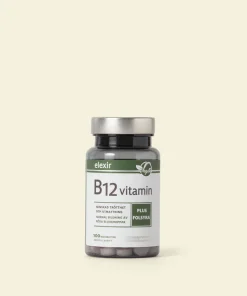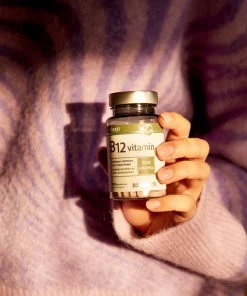Vitamin B12 does wonders for your body. With the right amount of vitamins, you will feel alert and ready to perform at your peak. If, on the other hand, you have too little vitamin B12, you may experience some side effects.
By eating a varied diet, choosing foods that contain vitamin B12 and, if necessary, supplementing with food supplements, you can sit calmly in the boat.
Why is it so important that I get vitamin B12?
In order for you to understand vitamin B12’s impact on you and your body, here is a short, easy-to-read biology lesson:
The cells in the body create tissues – muscle tissue, bone tissue and fat tissue. The tissues in turn create organs such as the heart and lungs. The cells wear out over time and they don’t live forever. They are frequently replaced with new healthy cells that continue the important work of keeping your heart pumping and breathing with your lungs.
Vital with Vitamin B12
So what does vitamin B12 have to do with cells? Vitamin B12 favors the production of red blood cells. The red blood cells transport oxygen to the cells which is required for the cells to survive and to be able to carry out their important work. That being said, vitamin B12 is vital for us to function as humans.
Vitamin B12 and the brain
Vitamin B12 contributes to normal psychological function and reduces fatigue and exhaustion.
What is the recommended intake of vitamin B12 per day?
The amount of vitamin B12 that you need to get is difficult to answer precisely. In part, gender and age play a role, and your current level of the vitamin also adjusts your need. If you are pregnant or breastfeeding, you need a higher dose of vitamin B12. It is important for fetal growth and favors the child’s physical and mental development.
To get an indication of what is reasonable, the Swedish Food Agency has created a “recommendation list” that you can look at here:
Gender/Group/Age Recommended daily intake micrograms
Infants 6-11 months 0,5
Infants 12-23 months 0,6
Children 2-5 years 0,8
Children 6-9 years 1,3
Children 10-13 years 2,0
Adults 2,0
Pregnant 2,0
Breastfeeding 2,6
What should I eat to get vitamin B12?
Are you vegan or lacto-ovo-vegetarian? Then it is very likely that you do not eat the foods that contain vitamin B12. The vitamin is formed by bacteria. The animals’ diet contains B12 vitamins, which are then transferred to us when we eat meat.
The foods that contain a lot of vitamin B12 are mainly meat, fish, shellfish and dairy products. In some vegetables and fruits there is vitamin B12, but unfortunately it is the type of vitamin that our body cannot absorb and therefore it does not help with the supply of vitamin B12. Because of this, it is recommended for vegans and lacto-ovo-vegetarians to take vitamin B12 as a dietary supplement or through fortified foods.
Foods that contain vitamin B12
Depending on how you prepare the food, the levels of vitamin B12 in the same food can vary, but only slightly. Keep track of these foods, which are taken from the Swedish Food Agency’s list, and you will know that you are helping the body by supplying vitamin B12.
- Lever
- Kidney
- Oyster
- Fumade
- Stone bit room
- Mackerel
- Liver paste
- Cancer
- Lax
- Clams
- Sill
- Baltic herring
- caviar
- Elk meat
- Reindeer meat
- Yolk
- Ost
- Beef
- College
What happens if I don’t get enough vitamin B12?
When you have ingested vitamin B12, the body picks up the vitamin in the small intestine and then stores it in the liver. If you do not have enough vitamin B12, it may be due to a poor diet but also that the body’s function of picking up the vitamin is messed up. In order for the body to be able to assimilate the vitamin, the stomach needs to produce the protein Intrinsic Factor , which ensures that vitamin B12 can be absorbed in the intestine.
Older people are more likely to have too little vitamin B12 in their bodies, due to poor ability to take advantage of the vitamin in the small intestine. Even gluten intolerant people can have problems with the absorption of vitamin B12 due to the same reason.
If you have too little vitamin B12 in your body, the first symptoms are headache, tingling sensation in different parts of the body, unusual fatigue and imbalance in the mouth such as burning on the tongue or sores on the corners of the mouth. If you go too long with too little vitamin B12 in your body, the consequences can be more serious, such as anemia or neurological symptoms.
How do I know if I have too little vitamin B12?
Since the first signs of vitamin B12 deficiency can come from many other conditions as well, it can be difficult to know if it is due to a lack of the vitamin. However, if you experience any of the signs mentioned above, it could be a warning of a deficiency and a visit to the health center to measure how your levels are and if you need to increase your intake.
What should I do if I have too little vitamin B12?
If you are told that you do not have enough vitamin B12 in your body, the doctor will prescribe vitamin B12 tablets to supplement your diet with.
If you recognize yourself in the signs that indicate that you have too little vitamin B12 in your body, you can try eating more foods that contain vitamin B12, or add vitamin B12 supplements to see if your problems disappear. Since it is not dangerous to take in more than the need for vitamin B12, there is no risk of adding more vitamin B12 .


